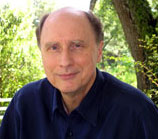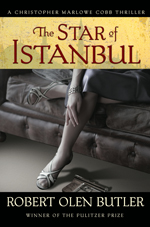 Robert Olen Butler has a permanent place on the top list of skillful and accomplished fiction writers. Reviewers for years have praised his ability to create characters that are genuine and realistic despite having qualities and lives that are radically different from the Pulitzer Prize-winning author.
Robert Olen Butler has a permanent place on the top list of skillful and accomplished fiction writers. Reviewers for years have praised his ability to create characters that are genuine and realistic despite having qualities and lives that are radically different from the Pulitzer Prize-winning author.
In his new book, The Star of Istanbul (Grove Atlantic, 2013), Butler takes a different approach with his main character, Christopher "Kit" Marlowe Cobb.
"He's closer to me than any other character I've written," Butler says in a recent profile published in USA Today. "Kit Cobb is unlike any character I've ever created; he's close to the bone."
In addition to this new style, The Star of Istanbul is Butler's first continuation of a storyline—and main character—from one novel to the next. As a follow-up to his 2012 publication The Hot Country, which is set during the Mexican Civil War, Butler situates the plot of The Star of Istanbul in the middle of World War I:
"Germany has allied itself with the Ottoman Empire, persuading the caliphs of Turkey to declare a jihad on the British Empire, as America's president, Woodrow Wilson, hesitates to enter the fray," reads the synopsis on Grove Atlantic's website. "The war correspondent and American spy Christopher Marlowe Cobb has been asked to follow a man named Brauer, a German intellectual and a possible covert secret service agent, into danger aboard the ship Lusitania, as the man is believed to hold information vital to the war effort. Aboard the Lusitania on its fateful voyage, Cobb becomes smitten with the famed actress Selene Bourgani, who for some reason appears to be working with German intelligence."
 While this foray into a thriller series is a departure from Butler's usual form of fiction, the reviewers are just as charmed with his adept construction of an engaging story.
While this foray into a thriller series is a departure from Butler's usual form of fiction, the reviewers are just as charmed with his adept construction of an engaging story.
"The Star of Istanbul has it all: history galore, exotic foreign settings, a world-weary yet engaging protagonist, villains in abundance and a romance worthy of Bogart and Bergman," writes Bruce Tierney on BookPage. A post on Kirkus Reviews reads, "Butler is an excellent observer of interior psychological detail . . . and his fine description of the Lusitania's demise shows he can write action-packed scenes as well… It's a pleasure to watch Cobb clear away layer upon layer of scheming and disguises to expose some ugly truths about humanity." The Wall Street Journal calls The Star of Istanbul, "zestful, thrilling… a ripping good yarn."
Butler stays just as tuned to character detail as well, as he shows in this excerpt:
I made another step to the side and another and I could see her again, in profile now, her long, straight nose beautifully at odds with the usual standards of beauty of this age. I thought: I bet her feet are large too and her hands and she is all the more beautiful for defying this world's conventions in these details. And I was still entranced by her nose, absorbing even the precise curve where its bridge met her brow, a perfect fit, I fancied, for my fingertip, when she said, "I am a film actress."
She'd hardly finished the sentence when one reporter leaped in before another hubbub of questions could begin. "Miss Bourgani," he said, "the world is at war." She turned her face instantly to him—in my general direction as well—and her dark eyes riveted him and his voice snagged as if he were suddenly beginning to choke. He managed to stammer a couple of meaningless vowel sounds and then he fell silent. The other reporters all laughed. But it was a sympathetic laugh. Hers was a face that could stop a thousand ships.
With this shift in storytelling, Butler hopes to entice the film industry to take notice of Christopher "Kit" Marlowe Cobb. If the readers latch onto the main character in The Hot Country and The Star of Istanbul—Butler says he is already working on the next book in the series—Cobb could soon be portrayed on the big screen.
"I've been Hollywood-wooed many a time. It's been a great source of revenue for me," he told USA Today. "Though I've never had a movie made, A Good Scent From a Strange Mountain [his 1993 Pulitzer Prize winner] won me a couple of screenwriting jobs… The readers in this genre, once they find a series, they go back and buy all the books and read all of them."
